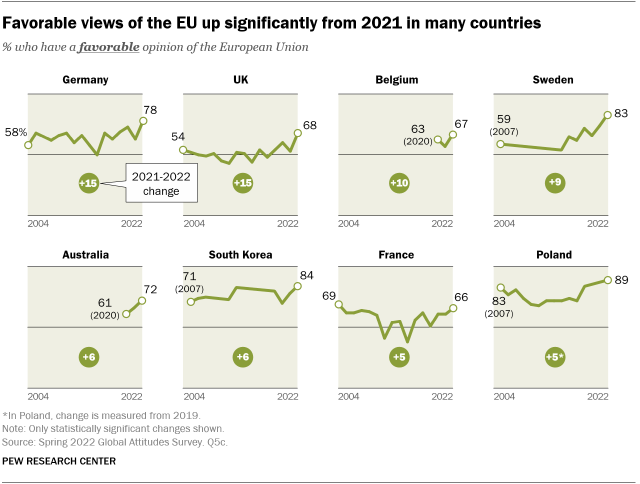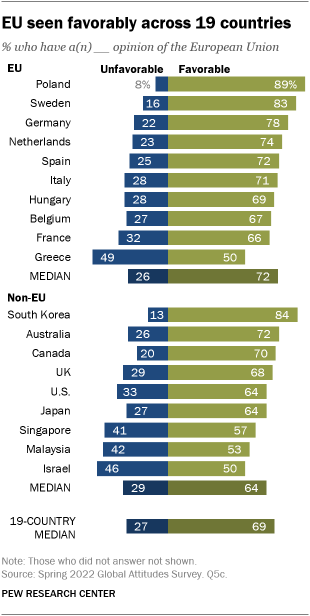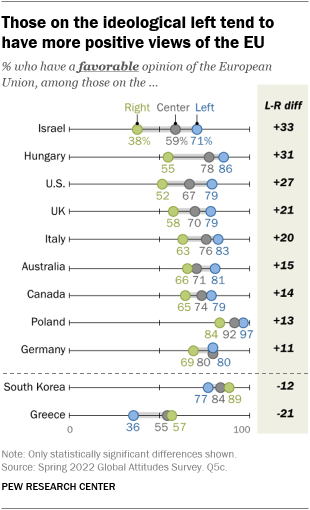The European Union is seen in a broadly favorable light both within the bloc and outside it, according to a Pew Research Center survey conducted this spring. A median of 69% of adults across 19 countries surveyed have a favorable opinion of the EU, while 27% have an unfavorable opinion.
Large majorities in nearly every surveyed member state see the EU in a favorable light, according to the poll, which was conducted in the early stages of Russia’s military invasion of Ukraine, but before the recent energy challenges that many European countries have faced as a result of the war.
A median of 72% of adults across the 10 surveyed EU member nations express a favorable view of the organization. Among the EU member countries polled, Greeks are the most divided in their views of the bloc. Half in Greece have a favorable view, while nearly the same share (49%) have an unfavorable opinion of it. This is in keeping with past trends in Greece, where favorable views of the EU have never risen above 53% in the nine years that Pew Research Center has asked this question.
In the nine non-EU countries surveyed, a median of 64% of adults have a favorable view of the organization, including more than six-in-ten adults in South Korea (84%), Australia (72%), Canada (70%), the United Kingdom (68%), the U.S. (64%) and Japan (64%). And while those in Singapore are more favorable than not on the alliance, opinion is more divided in Malaysia and Israel.
Positive opinion of the EU is at an all-time high in 10 of the 19 countries surveyed this spring, including in six of the 10 EU countries polled. The share of adults with a favorable view of the bloc has increased significantly over the past year in Germany (+15 percentage points), the UK (+15), Belgium (+10), Sweden (+9), Australia (+6), South Korea (+6) and France (+5). In Germany, for example, 78% have a positive opinion of the EU this year, up from the 63% who said the same in 2021.
In Poland, which borders Ukraine, favorable views of the EU have increased 5 percentage points since the question was last asked in 2019. And the share of Poles who have a very favorable view of the EU has increased 10 points over the same period, rising from 27% to 37%. (To read more about Polish views, see “Spotlight on Poland: Negative Views of Russia Surge, but Ratings for U.S., NATO, EU Improve.”)

In nearly all of the countries where favorable views of the EU have increased significantly since the question was last asked, the change has been particularly pronounced among those ages 50 and older. In the UK, for example, 42% of those 50 and older had a positive view of the EU in 2021. This year, 61% in this age group say the same – an increase of 19 percentage points.
In a handful of countries, those who place themselves on the ideological right have also grown more favorable toward the EU since 2021. Similarly, those with an unfavorable view of Russia now express more favorable sentiments about the EU than in years prior.
In countries outside the EU, favorable views of the organization have also increased over the past year. In South Korea, for example, the share of adults with a positive opinion is up 6 percentage points from last year, rising from 78% to 84%.
Both inside and outside of the bloc, views of the EU are associated with people’s ideological leanings. Those who place themselves on the ideological left often express a more favorable opinion of the EU than their counterparts on the right. For example, in Israel, 71% of those on the left have a positive view of the EU, while 38% of those on the right say the same – a difference of 33 percentage points. A similar pattern exists in Hungary, where 86% of those on the left feel favorably toward the EU, compared with 55% of those on the right. In seven additional countries, there is also a double-digit difference of this nature between those on the left and those on the right. This pattern is in line with previous findings.
As observed in previous years, supporters of right-wing populist parties are less likely to have a positive view of the EU than those who do not support these parties. In Germany, supporters of right-wing Alternative for Germany (53%) are less likely to express a favorable view of the EU than nonsupporters (82%). In all seven countries where this pattern exists, the difference between supporters of right-wing populist parties and nonsupporters is in the double digits.
In Hungary, those who support Fidesz, the ruling party led by Prime Minister Viktor Orban, are less likely to have a favorable opinion of the EU than those who do not support Fidesz. Those who support Jobbik, a right-wing party that has recently moved toward the center, are more likely to express a positive view toward the EU.
Views also differ by age in some countries. In seven countries, younger adults are more likely than older people to see the EU favorably. The biggest difference is in Singapore, where 69% of adults under age 30 say they have a favorable opinion of the EU, compared with fewer than half (47%) of those 50 and older. This pattern has also remained consistent from past years.
Note: Here are the questions used for this analysis, along with responses. Visit our methodology database for more information about the survey methods used in this survey. For more information on how we classify European populist parties, see Appendix.
Source: Pew Research


















